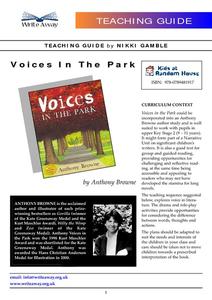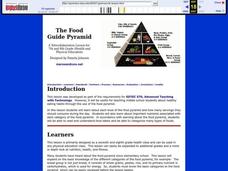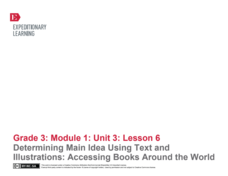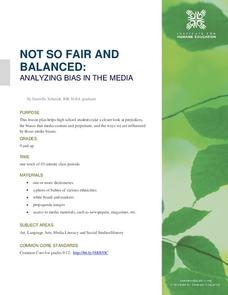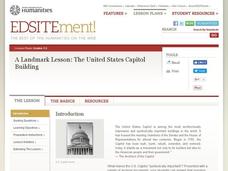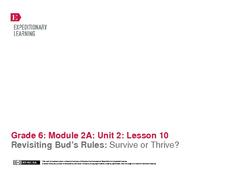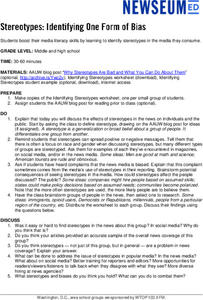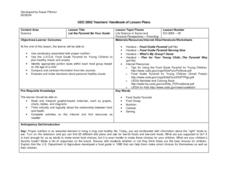Curated OER
The Legend of the Blue Bonnet
Students complete pre reading, writing, during reading, and interdisciplinary activities for the book The Legend of the Blue Bonnet. In this reading lesson plan, students complete journal entries, go over vocabulary, answer short answer...
Curated OER
L.R.C. Learning Reading Comprehension
Students demonstrate comprehension of reading material. They preview questions and then read silently. Students answer questions and write a short summary of the text they read.
Curated OER
Directed Reading Thinking Activity: "A Raisin in the Sun"
Students predict outcomes of a text. In this comprehension strategy lesson, students read a poem and compare it to the play A Raisin in the Sun. Students discuss their similarities and the power of dreams.
Write Away!
Voices In the Park
Explore the impact a narrator's point of view has on a story with a reading of the children's book, Voices in the Park by Anthony Browne. Written in four different voices, the story is told and retold from different perspectives to...
Curated OER
The Food Guide Pyramid
Students examine each level of the food pyramid and how many servings they should consume during the day. They study the important nutrients associated with each category of the food pyramid.
National Endowment for the Humanities
“Read All About It”: Primary Source Reading in “Chronicling America”
Can investigative journalism become too sensationalistic and accusatory, or is it vital for the survival of a democracy? Middle schoolers analyze primary source documents from early 20th-century newspapers as well as Theodore Roosevelt's...
Bantam Books
The Tempest: Think-Aloud Annotation
It can be difficult to refer back to a text when analyzing it, so annotation is a great tool for kids to track what they are reading. A thorough and well-organized activity guides learners through the process of annotating William...
EngageNY
Determining Main Idea Using Text and Illustrations: Accessing Books Around the World
Ease into informational text with the lesson suggested here. Part of a unit series, the lesson draws from previous lessons and acts as a natural moment to add in informational text. Class members read one section of My Librarian is a...
Scholastic
Citing Text Evidence
Could you go without your cell phone for 48 hours? Pose this question to your class and then read the article provided here. Pupils mark the text and and complete a graphic organizer that requires the use of textual evidence.
Curated OER
Strategies for Identifying Genres
Examine the different strategies that could be used to determine what genre something is with upper graders. They will learn that knowing the genre type can sometimes help their comprehension. They will also complete a worksheet to help...
US House of Representatives
Permanent Interests: The Expansion, Organization, and Rising Influence of African Americans in Congress, 1971–2007
The fourth installment of the seven-instructional activity unit focused on African Americans elected to and serving in the US Congress looks at the period from 1971 through 2007. Class members read a contextual essay that provides...
K20 LEARN
Deconstructing Reconstruction: The Reconstruction Era
High schoolers examine the Reconstruction programs instituted following the American Civil War, the potential for change these efforts offered, and the realities that occurred. Guided by a PowerPoint presentation, class members read a...
Institute for Humane Education
Not So Fair and Balanced: Analyzing Bias in the Media
Life is not always fair. Who's heard that before? This same concept moves to a larger scale using prejudice and bias. Pupils discuss where prejudice attitudes derive and how they develop throughout life. Reading comprehension...
Curated OER
A Landmark Lesson: The United States Capitol Building
Students study the events in American history that affected the US Capitol Building. They name activities that happen in and around the Capitol by looking at primary source documents that are available online.
Education Fund
Fear the Scarce Resources
In a life or death situation, what resources would you choose to survive—and why? A zombie attack simulation teaches learners the concepts of scarcity and resources in regards to economics. The hands-on activity requires individuals to...
American Chemical Society
The Periodic Table and Transuranium Elements
The periodic table has so much more to it than meets the uninformed eye. An inquiry-based lesson leads learners through the history of the discovery of several transuranium elements. They then use informational resources to build a...
K20 LEARN
Microbes and Manure = Biofuel
Waste not, want not! Science scholars explore manure as an alternative energy source through reading and experimentation. Groups construct their own biofuel digesters and observe the process of methane production. The teacher's guide...
Teaching Tolerance
Introducing 'The New Jim Crow'
When Jim Crow Laws ended, the intent behind them did not. Academics read "The New Jim Crow Laws" and an interview from the author to understand how racism has not ended, but rather changed over time. The lesson explains how prejudices in...
EngageNY
Getting the Gist: Steve Jobs Commencement Address (Focus on Paragraphs 6-8, and connecting to Chapter 6)
As part of a unit study of Bud, Not Buddy, readers compare Buddy's list of rules to live by with those that Steve Jobs enumerates in his commencement address to Stanford's 2005 graduating class.
K20 LEARN
#Unstressed #Stressed: Shakespearean Sonnets And Iambic Pentameter
Does any word rhyme with orange? Young poets try their hand at crafting a Shakespearean sonnet by first creating list of rhyming words. They then examine the use of unstressed and stressed syllables in iambic pentameter and the rhyme...
EngageNY
Revisiting Bud’s Rules: Survive or Thrive?
Bud followed a series of rules from Bud, Not Buddy by Christopher Paul Curtis. The question is, how did he use those rules to thrive or survive? After a grand discussion, class members explore the novel to locate and cite textual...
Newseum
Stereotypes: Identifying One Form of Bias
Class members brainstorm a list of people in the news (immigrants, millennials, etc.). Teams then select one to research. Using the provided worksheet and guided by a list of questions, the teams examine the stereotypes in news reports...
Curated OER
South Carolina Voices: Lessons from the Holocaust
Students read and summarize two different articles that are based on anit-Semitism. In this Holocaust lesson, students discuss if events in the articles could happen in today's society or not.
Curated OER
Let the Pyramid Be Your Guide
Students chart foods on the food guide pyramid and design nutritional food plans that include all the food groups.
Other popular searches
- Guided Reading Lessons Plans
- Guided Reading Lessons 4 6
- Guided Reading Lessons K 2
- Free Guided Reading Lessons
- Guided Reading Lessons Frogs
- Guided Reading Lessons 3 6
- Ell Guided Reading Lessons





